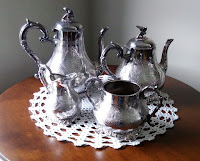52 Ancestors - Week 22 - So Far Away - Charles Woolcock
Some time between 18 December 1863 and 9th January 1865, Charles Woolcock arrived in New Zealand, a place far, far away from Cornwall and his wife and child. The name of the ship or ships he sailed upon is proving rather elusive and I've always wondered if he either came via Australia or under an assumed name to hide his whereabouts.
You may be wondering how I can be so accurate about the dates. Some years ago, the UK National Archives made available files from the Court for Divorce and Matrimonial Causes. I assumed it was a divorce document to dissolve the 1853 marriage of Charles Woolcock and Betsy Lawry that took place at Perranzabuloe, Cornwall. When it was finally transcribed, I was able to piece together the nature of a Victorian marriage and work out approximately when Charles arrived in New Zealand.
The May 1865 document in the archives is not a divorce or even a deed of separation. Instead it is a petition from Betsy for the protection of her earnings. It clearly outlines the steps Charles took in divesting himself of a wife and a child before emigrating. Betsy makes it clear that the reason for desertion was the disparity in their ages - 18 years is quite a difference when a husband is 35 and his wife is 53. Although I have some sympathy for Betsy, I also feel sorry for Charles who had few choices but stay in the marriage or desert his wife. The only way he could divorce was if Betsy had committed adultery. She was a devout Methodist so that was unlikely to happen.
Charles appears to have planned leaving quite well. He had arranged for his farming business at Newton Ferrers, close to the River Tamar and Plymouth, to be jointly run by his brother, John, and Betsy, and Betsy appears to have been a party to the decision. This was no small tenant farming operation. The 1861 census reveals that Charles was farming 430 acres, employing six men and a boy. He was also well enough respected in farming circles to be a livestock judge at the Royal Cornwall Show and had either enough land or income to be entitled to vote. Betsy herself was from a farming background, and continued to farm with John after the lease was renewed in 1865. By leaving, Charles was giving up so much more than his wife and daughter.
So why go so far away? Was Charles just sick of Betsy and farming? There may be clues from the 1850s and 1860s. There is Cornish newspaper evidence that Charles' brother-in-law had visited California and Australia where he had made money from gold. It is possible that Charles's brother, William, had emigrated to Ballarat in Victoria, Australia. Though the man I think is his brother continues to work as a blacksmith, he too may have joined Cornish miners heading to the gold fields. Charles himself settled in Greymouth in 1868 at the height of the West Coast gold rush, though he ran a very successful store. Following his short-lived parliamentary career, Charles spent some years in the 1880s at Mercury Bay on the Coromandel, again as a store keeper in a gold field. I've often wondered if the allure of gold was one of the reasons Charles left Betsy.
Until I found the protection order, I wondered if Charles' family knew where he had gone or if he had just disappeared. Betsy had a number of New Zealand relations including the wife of a prominent Methodist minister. Her brother, Walter Lawry, and his large family had also emigrated to Canterbury on the "Queen of the Mersey" in 1862. Did it comes as a shock to both Walter and Charles when they met in Christchurch on 9th January 1865? Walter wasted no time writing to his sister, if she was taking legal proceedings four months later. I'd love to know what Walter's thoughts were. He too was a Methodist lay preacher, and his lack of action when Charles remarried, went into politics and in 1878 went though a very public, well-publicised divorce, is surprising. It appears there would have been ample grounds for charges of bigamy, but are there things that Walter and his family knew that warranted their silence?
It is understandable that Betsy went to court to protect her earnings, though I doubt Charles would have reneged on his earlier arrangements. My only hope is that both Betsy and Charles were happier because Charles went so far away in search of a better life.
Until I found the protection order, I wondered if Charles' family knew where he had gone or if he had just disappeared. Betsy had a number of New Zealand relations including the wife of a prominent Methodist minister. Her brother, Walter Lawry, and his large family had also emigrated to Canterbury on the "Queen of the Mersey" in 1862. Did it comes as a shock to both Walter and Charles when they met in Christchurch on 9th January 1865? Walter wasted no time writing to his sister, if she was taking legal proceedings four months later. I'd love to know what Walter's thoughts were. He too was a Methodist lay preacher, and his lack of action when Charles remarried, went into politics and in 1878 went though a very public, well-publicised divorce, is surprising. It appears there would have been ample grounds for charges of bigamy, but are there things that Walter and his family knew that warranted their silence?
It is understandable that Betsy went to court to protect her earnings, though I doubt Charles would have reneged on his earlier arrangements. My only hope is that both Betsy and Charles were happier because Charles went so far away in search of a better life.


Comments
Post a Comment